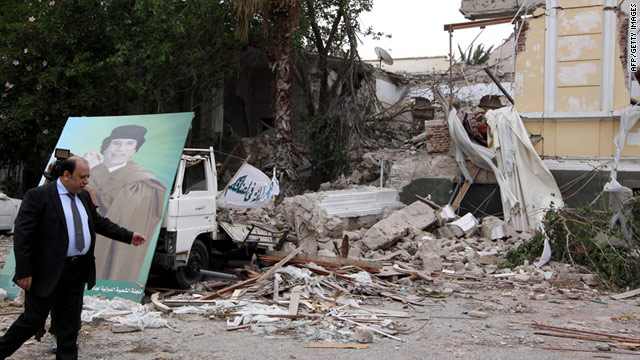One year today, Gadhafi's Tripoli compound fell to rebels. But #Libyais still fragile, says Christopher Chivvis. http://bit.ly/Nnw6wN
11:30 AM - 23 Aug 12 via web · Details

A year after the fall of Tripoli, Libya still fragile
By Christopher Chivvis, Special to CNN
Christopher S. Chivvis is a senior political scientist at the nonprofit, nonpartisan RAND Corporation and teaches at the Johns Hopkins, School of Advanced International Studies. The views expressed are his own.
A year since Tripoli fell to NATO-backed Libyan rebels, progress in achieving lasting security remains elusive and could even be faltering. Recent attackssuggest that Libya’s stability – and one of the Obama Administration’s biggest foreign policy successes – could be in danger. The countries that helped topple Moammar Gadhafi a year ago have a special obligation to ensure the new Libyan government gets all the help it needs to respond to these new threats effectively.
Gadhafi’s death last October marked the end of the war and the beginning of a new age for Libya. But progress on all fronts since then has been slow and hard-won. While Libya held successful national elections last month, a recent spate of terrorist-style attacks in Benghazi and Tripoli indicate the Libyans are not out of the woods yet.
Libya’s new government faces multiple challenges, including writing a constitution, finding work for war veterans and building modern administrative structures almost from scratch. Such tasks are challenging enough under the best conditions. Under the pall of a deteriorating security situation, they could become impossible.
The rebel army was made up of hundreds of militias. They were willing to work together to oust Gadhafi, but refused to lay down their arms when the war ended. As a result, the security situation in Libya has been highly fragmented since Tripoli fell. Individual militias own the use of force in the towns and neighborhoods they occupied when the war ended.
Luckily, clashes between militia have only been sporadic, and haven’t seriously undermined security or posed a major threat to Libya’s civilian population. But recent car bombings and attacks on government buildings in Tripoli and therebel stronghold of Benghazi are different.
Libyan officials have said they believe rump Gadhafi supporters are behind these attacks, raising the specter of a low-level insurgency. Because the attacks follow closely on the heels of the national election, it’s likely that they are intended at least in part to challenge the new ruling authorities. They could also be aimed at eliciting an overreaction that would deepen divides between Libya’s new leadership and the communities in Libya favored by the Gadhafi’s regime.
History shows repeatedly that maintaining security is critical for a country to make a successful transition from war to peace. Absent security, progress on building political institutions, generating economic growth, and rebuilding trust in government is extremely difficult. Low-level violence that targets government forces and threatens civilians could also empower militias at the expense of the nascent government if the government is perceived as unable to respond effectively.
It remains to be seen how effective the nascent Libyan state can be in thwarting such attacks given its relative weakness on security. At the behest of the Libyan authorities, and the wishes of most Western capitals, NATO did not deploy a post-conflict force in Libya to help provide security when the war was over.
This may have been for the best. Maximizing local ownership is essential for post-conflict success. But with the situation deteriorating, NATO members and the Gulf States that helped topple Gadhafi have a special obligation to ensure the new Libyan government gets all the help it needs to respond adroitly.







